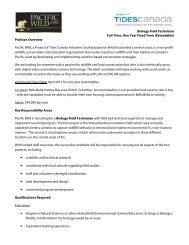Entrepreneurial Solutions to Insoluble Problems - Tides Canada
Entrepreneurial Solutions to Insoluble Problems - Tides Canada
Entrepreneurial Solutions to Insoluble Problems - Tides Canada
- No tags were found...
Create successful ePaper yourself
Turn your PDF publications into a flip-book with our unique Google optimized e-Paper software.
Growing OpportunityDeeper Dive: HealthFor good or ill, there is awidespread and deeplyheld public unease at therole of private enterpriseat the heart of healthcaredelivery.The kaleidoscopic nature of these tasks andthe immediacy and importance of the endgoal has attracted hundreds of socialentrepreneurs in<strong>to</strong> the health space wherethey have applied ingenuity, determination,and creativity <strong>to</strong> the huge challenges ofmeeting healthcare needs of the some ofthe poorest people in the world. Figure 4.2highlights some of the challenges facingthe healthcare sec<strong>to</strong>r.Relevance <strong>to</strong> businessEven <strong>to</strong> frame the relevance <strong>to</strong> mainstreambusiness of what social entrepreneursare doing in the health arena in termsof a business case can be fraught withdifficulties. For good or ill, there is awidespread and deeply held public uneaseat the role of private enterprise at the hear<strong>to</strong>f healthcare delivery, and any high profilereminder of commercial drivers can lead<strong>to</strong> an outpouring of moral outrage aboutdis<strong>to</strong>rted priorities. One key reason: sincethe Greek philosopher and ‘Father ofMedicine’, Hippocrates, launched hisHippocratic Oath in around 350 BC,medical ethics have sought <strong>to</strong> put thebest interests of the patient above allother considerations.31The result is an enduring belief in medicineas an entitlement, coupled with a resistance<strong>to</strong> arguments about commercial realitiessuch as profit maximization. However realsuch considerations are for companiesdelivering healthcare in poor markets, theyare all <strong>to</strong>o readily interpreted by critics as‘profiteering’ from sick, poor people in thecase of drug companies or, in the case ofwater utilities, putting profits ahead of abasic human right.Although this attitude may provide amighty disincentive for companies <strong>to</strong>engage in these markets, paradoxically —and here’s the rub — demand for theiractive engagement as a partner in solvingsome of the more intractable health-relatedproblems in the developing world continuesunabated and is likely <strong>to</strong> grow.In a globalized economy, emerging marketsare increasingly critical <strong>to</strong> mainstream firms— as a source of growth opportunities, costefficiencies and political risks. Forecastsfor drug and overall health expenditureincreases in China and India between 2007and 2009, for example, are predicted <strong>to</strong> risefrom $30 <strong>to</strong> 40 billion and $132 <strong>to</strong> 163billion, respectively.Figure 4.2ChallengesPreventionLow levels of health educationLack of clean waterLow vaccination ratesR&DHigh cost of medicineDrug development focusedon ‘profitable’ marketsDeliveryPoor transportation infrastructureInsufficient numbers of health workersInadequate government infrastructure
















